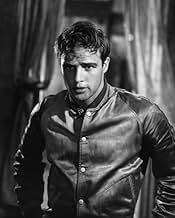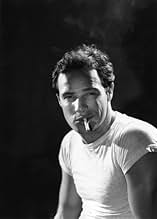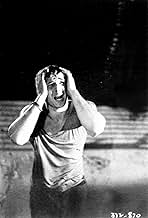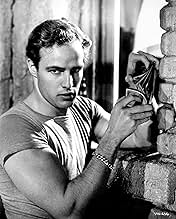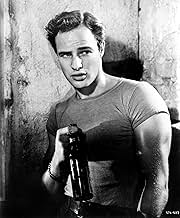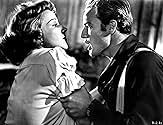A perturbada Blanche DuBois se muda com sua irmã em Nova Orleans e é atormentada por seu brutal cunhado.A perturbada Blanche DuBois se muda com sua irmã em Nova Orleans e é atormentada por seu brutal cunhado.A perturbada Blanche DuBois se muda com sua irmã em Nova Orleans e é atormentada por seu brutal cunhado.
- Ganhou 4 Oscars
- 22 vitórias e 15 indicações no total
James Adamson
- Extra
- (não creditado)
Irene Allen
- Extra
- (não creditado)
Mel Archer
- Foreman
- (não creditado)
Walter Bacon
- Club Patron
- (não creditado)
Dahn Ben Amotz
- Minor Role
- (não creditado)
Avaliações em destaque
Blanche DuBois reminds me of Norma Desmond in Sunset Blvd. (1950). Both characters succumb to their alter egos, and descend into their own worlds of fantasy and half-truths.
In "A Streetcar Named Desire", Blanche travels from her antebellum roots in Mississippi to New Orleans, to see her sister Stella. But, upon arriving in the Big Easy, Blanche must confront Stella's husband Stanley, a greasy, poker-playing neanderthal lout who knows a thing or two about reality. It's the clash between Blanche's stately delusions and Stanley's gritty realism that soups up the drama in this Tennessee Williams play, converted to film classic by director Elia Kazan.
The drama is absorbing. But the performances of Marlon Brando and Vivien Leigh, as Stanley and Blanche, are what make the film the cinematic powerhouse that it is. Excellent B&W lighting and jazzy background music amplify the seedy, sleazy atmosphere, which adds depth and texture to the story and the acting. And, of course, the claustrophobic, steamy French Quarter makes a perfect setting.
As one would expect for a film derived from a play, "A Streetcar Named Desire" is very talky. Generally, I don't care for films burdened with a ten thousand page script. But this talk-fest is an exception. Overwhelming what I would otherwise consider a weakness, the acting of Brando and Leigh alone are enough to justify a two hour investment, and render an enjoyable and memorable cinematic experience.
In "A Streetcar Named Desire", Blanche travels from her antebellum roots in Mississippi to New Orleans, to see her sister Stella. But, upon arriving in the Big Easy, Blanche must confront Stella's husband Stanley, a greasy, poker-playing neanderthal lout who knows a thing or two about reality. It's the clash between Blanche's stately delusions and Stanley's gritty realism that soups up the drama in this Tennessee Williams play, converted to film classic by director Elia Kazan.
The drama is absorbing. But the performances of Marlon Brando and Vivien Leigh, as Stanley and Blanche, are what make the film the cinematic powerhouse that it is. Excellent B&W lighting and jazzy background music amplify the seedy, sleazy atmosphere, which adds depth and texture to the story and the acting. And, of course, the claustrophobic, steamy French Quarter makes a perfect setting.
As one would expect for a film derived from a play, "A Streetcar Named Desire" is very talky. Generally, I don't care for films burdened with a ten thousand page script. But this talk-fest is an exception. Overwhelming what I would otherwise consider a weakness, the acting of Brando and Leigh alone are enough to justify a two hour investment, and render an enjoyable and memorable cinematic experience.
Now that this filmization of "Streetcar" is over a half century old, it can be looked at in a more objective manner than that of the early fifties. The "classical/traditional" acting style of Vivien Leigh, which was placed in stark contrast to the rest of the production personnel, continues to hold its own brilliantly.
It's probably hard today for some to imagine the strong opposition Leigh's casting faced back in 1950, when this prim actress from England was chosen (mostly by studio chief Jack Warner) over "method" Broadway actress Jessica Tandy.
A goodly number of cast and production people from the hit play directed by Elia Kazan were engaged by the director for the film version, and they were not at all enthusiastic about risking a "clash" of acting styles in the leading, pivotal role of Blanche. Kazan himself was reportedly very pro-Tandy, and quite disappointed in the studio's decision.
Yet, Warner and his staff felt Tandy wasn't that well known to the general movie going public--especially in contrast to Leigh, whose marquee name was by then almost magical. In recent interviews, Kazan admitted that working with Vivien was "a real challenge."
In looking at the film today, however, it's Leigh who emerges as a genuine "star" of this production. True, her facial expressions, vocal inflections and body gestures may be the result of careful, deliberate planning, but so what? It's also the aspect that commands attention and draws the viewer to her portion of the screen throughout this film.
Her southern accent, so well learned and retained from her work as Scarlett in "GWTW," is convincing and very beautiful to hear. It also fits Blanche perfectly, as does Leigh's stylized "choreography," which was undoubtedly retained from her long-running London stage performance.
Not all the combined, formidable talents of "method" giants as Karl Malden, Kim Hunter, Marlon Brando or Kazan can diminish the hypnotic work of Leigh here. It may not have excited "Gadge" Kazan, but it remains a highlight performance in film history (and impressed the Academy enough to bestow an "Oscar" to Vivien.)
It also didn't hurt to have Alex North's pungent score, which remains this composer's finest hour.
It's probably hard today for some to imagine the strong opposition Leigh's casting faced back in 1950, when this prim actress from England was chosen (mostly by studio chief Jack Warner) over "method" Broadway actress Jessica Tandy.
A goodly number of cast and production people from the hit play directed by Elia Kazan were engaged by the director for the film version, and they were not at all enthusiastic about risking a "clash" of acting styles in the leading, pivotal role of Blanche. Kazan himself was reportedly very pro-Tandy, and quite disappointed in the studio's decision.
Yet, Warner and his staff felt Tandy wasn't that well known to the general movie going public--especially in contrast to Leigh, whose marquee name was by then almost magical. In recent interviews, Kazan admitted that working with Vivien was "a real challenge."
In looking at the film today, however, it's Leigh who emerges as a genuine "star" of this production. True, her facial expressions, vocal inflections and body gestures may be the result of careful, deliberate planning, but so what? It's also the aspect that commands attention and draws the viewer to her portion of the screen throughout this film.
Her southern accent, so well learned and retained from her work as Scarlett in "GWTW," is convincing and very beautiful to hear. It also fits Blanche perfectly, as does Leigh's stylized "choreography," which was undoubtedly retained from her long-running London stage performance.
Not all the combined, formidable talents of "method" giants as Karl Malden, Kim Hunter, Marlon Brando or Kazan can diminish the hypnotic work of Leigh here. It may not have excited "Gadge" Kazan, but it remains a highlight performance in film history (and impressed the Academy enough to bestow an "Oscar" to Vivien.)
It also didn't hurt to have Alex North's pungent score, which remains this composer's finest hour.
A dramatic and disturbing film based on Tennessee Williams's play . It deals with the tarnished Blanche DuBois (Vivien Leigh is unforgettable as a fading southern belle) who moves to live in New Orleans with her sister, Stella (Kim Hunter) , but there things go wrong when she meets her brutish , heavy-drinking brother-in-law, Stanley Kowalski (a sweaty , animalistic Marlon Brando , a role who shot him to superstardom) in his rattrap New Orleand apartment . As Blanche is a sexually disturbed woman who lives in a world of illusion . Her world starts to crumble when she moves in with her sister, as circumstances become unbearable when rumors of Blanche's dark past begin knowing among neighbors and then the happenings go awry ...When she got there she met the brute Stan, and the side of New Orleans she hardly knew existed. The Pulitzer Price Play of New Orleans' Latin Quarter...of a Lonely Girl...of Emotions Gone Savage!... Blanche, who wanted so much to stay a lady... Warner Bros. Bring the screen all the fire of A Streetcar Named Desire.
Well-deserved Academy Awards were garnered by Vivien Leigh as main actress , while Kim Hunter and Karl Malden won as secondary actors, providing all of them terrific and hypnotic qualities on their extraordinary interpretations . The excellent production design is first-rate , being competently set in the French Quarter of New Orleans during the restless years following World War Two . Main and support cast are frankly magnificent delivering excellent interpretation. Vivien Leigh is awesome as a fragile and neurotic woman who has suffered a series of calamities in her thunderous life . Marlon Brando gives a terrific acting as the abusive ,sinewy , brutish brother-in-law who believes to live under Louisiana's Napoleonic code what belongs to the wife belongs to the husband. They're very well accompanied by a great support cast , such as : Kim Hunter , Karl Malden , Rudy Bond and Nick Dennis. However , one reservation , all the roles are just fairly unbelieable and really exaggerated with the exception for Kim Hunter.
The motion picture was stunningly directed by Elia Kazan and considered to be one of the best films of the year , as he said it was one of his favorites of all the movies he made . Although gloomy and sordid throughout A Streetcar Named Desire fascinates rather than alienates the audience , thanks to the unpredictability of the play and riveting art decoration and set decoration that were both also rewarded with Academy Awards. During his long career, Kazan won two Oscars as Best Director and received an Honorary Oscar, won three Tony Awards, and four Golden Globe Awards. Kazan directed four performers to Best Actress Oscars: Celeste Holm, Kim Hunter, Eva Marie Saint and Jo Van Fleet. Greek-Turkish director Elia Kazan who being a child emigrated along with his family to United States made magnificent films . Some of them describe memories , emotions and infancy images , narrating the persecution to Greeks and Armenians by Turkish that finished in genocide as in ¨America , America¨ . Kazan directed a string of successful films as ¨Gentleman's agreement¨, ¨Man on a tightrope¨, ¨panic in the streets¨, ¨Pinky¨ , ¨Splendor in the grass¨, ¨Baby doll¨, ¨the engagement¨, ¨a Street named desire¨, ¨East of Eden¨ and especially his greatest hit : ¨On the waterfront¨ , the latter includes biographic elements ; in fact, Kazan worked in this waterfront area in 1934 during the height of the Great Depression .
There are other versions , but roughly inferior , based on the classic play by Tennessee Williams titled ¨A Streetcar Named Desire¨ , such as : 1984 by John Erman Ann-Margret as Blanche DuBois , Treat Williams as Stanley Kowalski and Beverly D'Angelo as Stella DuBois Kowalski. And 1995 rendition by Glenn Jordan with Jessica Lange , Alec Baldwin , Diane Lane , Randy Quaid and John Goodman.
Well-deserved Academy Awards were garnered by Vivien Leigh as main actress , while Kim Hunter and Karl Malden won as secondary actors, providing all of them terrific and hypnotic qualities on their extraordinary interpretations . The excellent production design is first-rate , being competently set in the French Quarter of New Orleans during the restless years following World War Two . Main and support cast are frankly magnificent delivering excellent interpretation. Vivien Leigh is awesome as a fragile and neurotic woman who has suffered a series of calamities in her thunderous life . Marlon Brando gives a terrific acting as the abusive ,sinewy , brutish brother-in-law who believes to live under Louisiana's Napoleonic code what belongs to the wife belongs to the husband. They're very well accompanied by a great support cast , such as : Kim Hunter , Karl Malden , Rudy Bond and Nick Dennis. However , one reservation , all the roles are just fairly unbelieable and really exaggerated with the exception for Kim Hunter.
The motion picture was stunningly directed by Elia Kazan and considered to be one of the best films of the year , as he said it was one of his favorites of all the movies he made . Although gloomy and sordid throughout A Streetcar Named Desire fascinates rather than alienates the audience , thanks to the unpredictability of the play and riveting art decoration and set decoration that were both also rewarded with Academy Awards. During his long career, Kazan won two Oscars as Best Director and received an Honorary Oscar, won three Tony Awards, and four Golden Globe Awards. Kazan directed four performers to Best Actress Oscars: Celeste Holm, Kim Hunter, Eva Marie Saint and Jo Van Fleet. Greek-Turkish director Elia Kazan who being a child emigrated along with his family to United States made magnificent films . Some of them describe memories , emotions and infancy images , narrating the persecution to Greeks and Armenians by Turkish that finished in genocide as in ¨America , America¨ . Kazan directed a string of successful films as ¨Gentleman's agreement¨, ¨Man on a tightrope¨, ¨panic in the streets¨, ¨Pinky¨ , ¨Splendor in the grass¨, ¨Baby doll¨, ¨the engagement¨, ¨a Street named desire¨, ¨East of Eden¨ and especially his greatest hit : ¨On the waterfront¨ , the latter includes biographic elements ; in fact, Kazan worked in this waterfront area in 1934 during the height of the Great Depression .
There are other versions , but roughly inferior , based on the classic play by Tennessee Williams titled ¨A Streetcar Named Desire¨ , such as : 1984 by John Erman Ann-Margret as Blanche DuBois , Treat Williams as Stanley Kowalski and Beverly D'Angelo as Stella DuBois Kowalski. And 1995 rendition by Glenn Jordan with Jessica Lange , Alec Baldwin , Diane Lane , Randy Quaid and John Goodman.
... of two powerhouse juggernauts. Absolutely dripping with tension, acrimony and bitterness as Blanche DuBois and Stanley Kowalski lock horns in their own uniquely individual way with the backdrop a dark, drenched and run down part of New Orleans. Coupled with a pair of superb supporting performances that amplify and escalate the whole to a unique plateau, you'll feel as though you've been run down by an out of control steam train, flattened by a steamroller to be reformed in a furnace fuelled by fear, frustration and desire.
With a screenplay by Tennessee Williams, direction from Elia Kazan and quite possibly the greatest performance ever in Vivien Leigh's Blanche DuBois- you can't go wrong.
This movie is dark, gritty and, at times, disturbing in its portrayals of domestic abuse and mental illness. It's astonishing how much of a punch this movie still has after all these years. This just goes to show what a true genius Tennessee Williams really was. The characters he wrote, with all their own complexities and contradictions, and the script with its haunting poetry and now iconic lines are all classic.
But what good is a great script without great actors? Well, luckily, the cast couldn't have been better. Here we have a young Marlon Brando as the brutish Stanley Kowalski, who is truly ferocious in the role. We then have Kim Hunter who gives a great performance as the weak-willed Stella. Stella is the most likeable character in the movie for all she wants is for everyone to get along. Karl Malden is equally great as Mitch, who is seemingly weak and simple and serves as a contrast to Stanley's brutality. Then we have Vivien Leigh as Blanche DuBois. As I said above, I believe Leigh's performance here to be the greatest ever to be committed to film and here's why- Blanche DuBois is probably one of the most complicated characters ever written. She's a compulsive liar, who lives in a world of her own, choosing to create her own reality rather than acknowledge her bleak surroundings. She's a snob, a hypocrite and a user but at the same time she's an underdog who's had a tough life and just wants to be loved. Tennessee Williams himself said of Vivien's performance that 'she brought everything I intended to the role and even much more than I had dared dream of' which pretty much sums up her performance here. She truly gives herself to the darkness of Blanche DuBois, she's unpredictable, tormented and haunting while still somehow sympathetic. Through Leigh's mastery of her character we see that Blanche is really just a daffodil in a windstorm rather than a bad person. Every time I watch this film I notice a new nuance in her performance, whether it's a look in her eye that I hadn't noticed before or a change in her voice as Blanche lets her mask slip- never has there been such a true embodiment of a character.
So all this considered, with Kazan's brilliant direction, great cinematography and the unique "jazzy" score, is why I consider 'A Streetcar Named Desire' one of the greatest films ever made. It's not a film for everyone- it's heavy from the start, it's quite talky and most of the film takes place within the Kowalski's apartment but if you want a movie with brilliant acting and a dark, poetic script then there's no better film than this.
This movie is dark, gritty and, at times, disturbing in its portrayals of domestic abuse and mental illness. It's astonishing how much of a punch this movie still has after all these years. This just goes to show what a true genius Tennessee Williams really was. The characters he wrote, with all their own complexities and contradictions, and the script with its haunting poetry and now iconic lines are all classic.
But what good is a great script without great actors? Well, luckily, the cast couldn't have been better. Here we have a young Marlon Brando as the brutish Stanley Kowalski, who is truly ferocious in the role. We then have Kim Hunter who gives a great performance as the weak-willed Stella. Stella is the most likeable character in the movie for all she wants is for everyone to get along. Karl Malden is equally great as Mitch, who is seemingly weak and simple and serves as a contrast to Stanley's brutality. Then we have Vivien Leigh as Blanche DuBois. As I said above, I believe Leigh's performance here to be the greatest ever to be committed to film and here's why- Blanche DuBois is probably one of the most complicated characters ever written. She's a compulsive liar, who lives in a world of her own, choosing to create her own reality rather than acknowledge her bleak surroundings. She's a snob, a hypocrite and a user but at the same time she's an underdog who's had a tough life and just wants to be loved. Tennessee Williams himself said of Vivien's performance that 'she brought everything I intended to the role and even much more than I had dared dream of' which pretty much sums up her performance here. She truly gives herself to the darkness of Blanche DuBois, she's unpredictable, tormented and haunting while still somehow sympathetic. Through Leigh's mastery of her character we see that Blanche is really just a daffodil in a windstorm rather than a bad person. Every time I watch this film I notice a new nuance in her performance, whether it's a look in her eye that I hadn't noticed before or a change in her voice as Blanche lets her mask slip- never has there been such a true embodiment of a character.
So all this considered, with Kazan's brilliant direction, great cinematography and the unique "jazzy" score, is why I consider 'A Streetcar Named Desire' one of the greatest films ever made. It's not a film for everyone- it's heavy from the start, it's quite talky and most of the film takes place within the Kowalski's apartment but if you want a movie with brilliant acting and a dark, poetic script then there's no better film than this.
Você sabia?
- CuriosidadesAs the film progresses, the set of the Kowalski apartment actually gets smaller to heighten the suggestion of Blanche's increasing claustrophobia.
- Erros de gravaçãoWhen Stanley comes back from taking Stella to the hospital, he is looking for a bottle opener. He finds it on the mantelpiece, shakes up a bottle of beer, and opens it. The beer foams up and spills on his trousers. But if you watch at the moment when he swings himself up to sit on the table - before he opens the bottle - you can see that the front of his trousers are already wet. Apparently they re-shot it without him changing into dry trousers.
- Versões alternativasThe scene in which Blanche and Stanley first meet was edited a bit to take out some of the sexual tension that both had towards each other when the film was first released in 1951. In 1993, this footage was restored in the "Original Director's Version" of the film. The three minutes of newly-added footage sticks out from the rest of the film because Warner Brothers did not bother to restore these extra film elements along with the rest of the movie, leaving them very scratchy due to deterioration.
- ConexõesEdited into Un Américain nommé Kazan (2018)
- Trilhas sonorasIt's Only a Paper Moon
(1933) (uncredited)
Music by Harold Arlen
Lyrics by E.Y. Harburg and Billy Rose
Sung by Vivien Leigh while doing her hair
Principais escolhas
Faça login para avaliar e ver a lista de recomendações personalizadas
Detalhes
- Data de lançamento
- País de origem
- Idiomas
- Também conhecido como
- Un tranvía llamado Deseo
- Locações de filme
- Nova Orleans, Louisiana, EUA(railway station)
- Empresas de produção
- Consulte mais créditos da empresa na IMDbPro
Bilheteria
- Orçamento
- US$ 1.800.000 (estimativa)
- Faturamento bruto mundial
- US$ 55.437
- Tempo de duração
- 2 h 2 min(122 min)
- Cor
- Proporção
- 1.37 : 1
Contribua para esta página
Sugerir uma alteração ou adicionar conteúdo ausente







